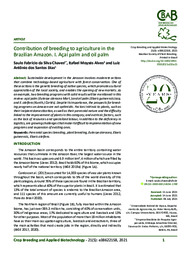Contribution of breeding to agriculture in the Brazilian Amazon. I. Açaí palm and oil palm.
Contribution of breeding to agriculture in the Brazilian Amazon. I. Açaí palm and oil palm.
Author(s): CHAVES, S. F. da S.; ALVES, R. M.; DIAS, L. A. dos S.
Summary: Sustainable development in the Amazon involves moderate actions that combine technology-based agriculture with forest conservation. One of these actions is the genetic breeding of native species, which promotes cultural appreciation of the local society, and enables the opening of new markets. As an example, two breeding programs with solid results will be mentioned in this review: açaí palm (Euterpe oleracea Mart.) and oil palm (Elaeis guineensis Jacq. and E. oleifera (Kunth.) Cortés). Despite its importance, the prospects for breeding programs on Amazon are not optimistic. Factors intrinsic to plants, such as their incipient domestication, as well as their perennial nature and the difficulty linked to the improvement of plants in this category; and extrinsic factors, such as the lack of resources and specialized labour, in addition to the deficiency in logistics, are growing challenges that make it difficult to implementation of new programs and expansion of existing ones.
Publication year: 2021
Types of publication: Journal article
Unit: Embrapa Eastern Amazon
Keywords: Açaí, Dendê, Elaeis Guineensis, Elaeis Oleifera, Euterpe Oleracea
Observation
Some of Embrapa's publications are published as ePub files. To read them, use or download one of the following free software options to your computer or mobile device. Android: Google Play Books; IOS: iBooks; Windows and Linux: Calibre.
Access other publications
Access the Agricultural Research Database (BDPA) to consult Embrapa's full library collection and records.
Visit Embrapa Bookstore to purchase books and other publications sold by Embrapa.

